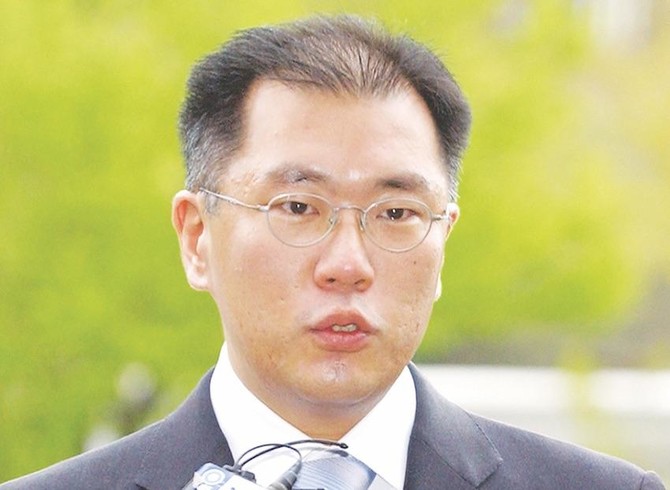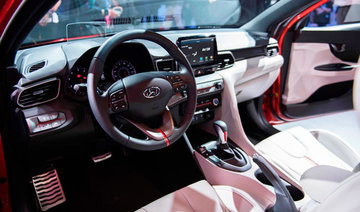SEOUL: South Korea’s auto-to-steel giant Hyundai Motor Group will streamline its complex ownership structure, as it responds to calls from the government and investors to reform the country’s powerful family-controlled conglomerates or chaebol.
Hyundai Mobis Co. Ltd, a key affiliate, will spin off its module and after-service parts businesses and merge them with another group affiliate, Hyundai Glovis.
Parent Hyundai Motor Group’s Chairman Chung Mong-koo and his son Chung Eui-sun, who is vice chairman, will then buy stakes in Mobis held by other affiliates Kia Motors, Glovis and Hyundai Steel.
The various deals are aimed at resolving the group’s circular shareholdings, which critics have long said give too much power to Hyundai’s controlling Chung family at the expense of shareholders.
Hyundai, South Korea’s second-biggest conglomerate after Samsung, is the latest chaebol to step up corporate governance amid pressure from the administration of President Moon Jae-in, which has pledged to reform the powerful businesses in the wake of a corruption scandal involving Samsung.
The restructuring also comes as Hyundai Motor, Kia Motors and affiliated parts makers struggle with dwindling profits and sales in major markets such as China and the United States, in part due to a delayed response to the burgeoning sport utility market and Seoul’s diplomatic row with Beijing last year.
“Upon such business restructuring, the Group’s corporate governance will become more streamlined,” the group said in a statement on Wednesday.
South Korea’s antitrust chief Kim Sang-jo told Reuters in August he had been in talks with Hyundai Motor Group about overhauling its circular ownership structure.
The Fair Trade Commission said in a statement that “Hyundai Motor Group’s efforts to improve governance structure to respond to the market’s demand is positive.”
Shares of Hyundai affiliates jumped across the board on expectations of an imminent restructuring on Wednesday. Hyundai Mobis rose 6.7 percent and Hyundai Glovis climbed 10.2 percent ahead of the announcement.
Shares in Kia Motors also ended up 3.9 percent, outperforming the wider market’s 1.3 percent fall.
Under the proposed plan, Mobis shareholders will receive 0.61 new share of Glovis stock for each share of Mobis.
Mobis will continue to operate its auto parts-making businesses, focusing on autonomous driving and connectivity and “aggressively pursue equity investments and acquisitions,” the group said.
A company source told Reuters the change will result in Mobis being at the top of Hyundai’s ownership structure — with chairman Chung becoming the biggest shareholder and the vice chairman, the second-biggest, with a 15-16 percent stake and 14 percent stake, respectively, based on current stock prices.
The deal will allow the younger Chung to secure a stake in Mobis, as he is groomed to take over the family-run empire from his father Chung.
The spin-off merger is subject to approval at the general shareholders’ meetings of Mobis and Glovis, scheduled for May 29.
The two Chungs plan to raise additional capital to acquire shares of Mobis through the sale of shares in Glovis or by way of other means.
President Moon took office in May, in the wake of a graft scandal that led to the ouster of his predecessor, Park Geun-hye, as well as the arrest of the chief of Samsung Group, Jay Y. Lee.
Moon pledged to improve corporate governance and curb the power of the chaebols that dominate Asia’s fourth-biggest economy. He appointed Kim, nicknamed the “chaebol sniper” for his shareholder activist campaigns of the past two decades, to head the country’s antitrust watchdog.
At the heart of the governance conundrum are the interlocking shareholdings among group companies held by their founding families, which mean that if one affiliate goes insolvent, another affiliate will often be forced to come to the rescue.
It has been cited as a major factor behind the so-called “Korea Discount” — meaning their shares are typically undervalued in comparison to global peers.
In Hyundai’s case, Chairman Chung holds a 6.96 percent in the parts affiliate Hyundai Mobis, which owns 20.78 percent of Hyundai Motor. South Korea’s top automaker then controls 33.88 percent of the second-ranked Kia Motors, which in turn owns 16.88 percent of Hyundai Mobis.
— Reuters
Chung Eui-Sun, president of Hyundai Motors key affiliate Kia Motors, whose shares rose 3.9 percent. (AFP)
















